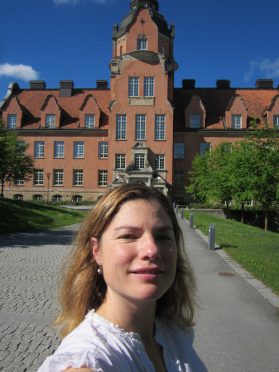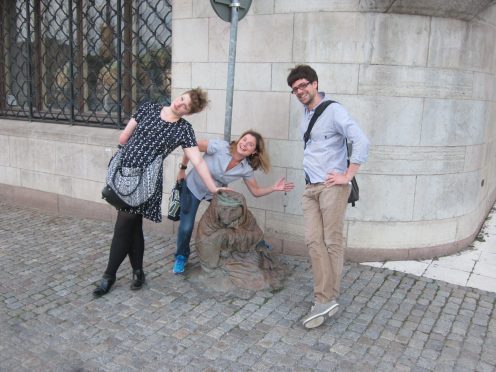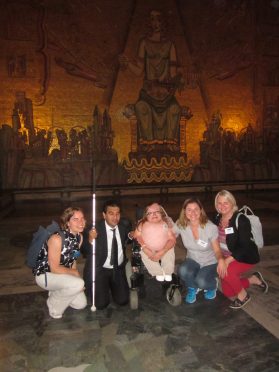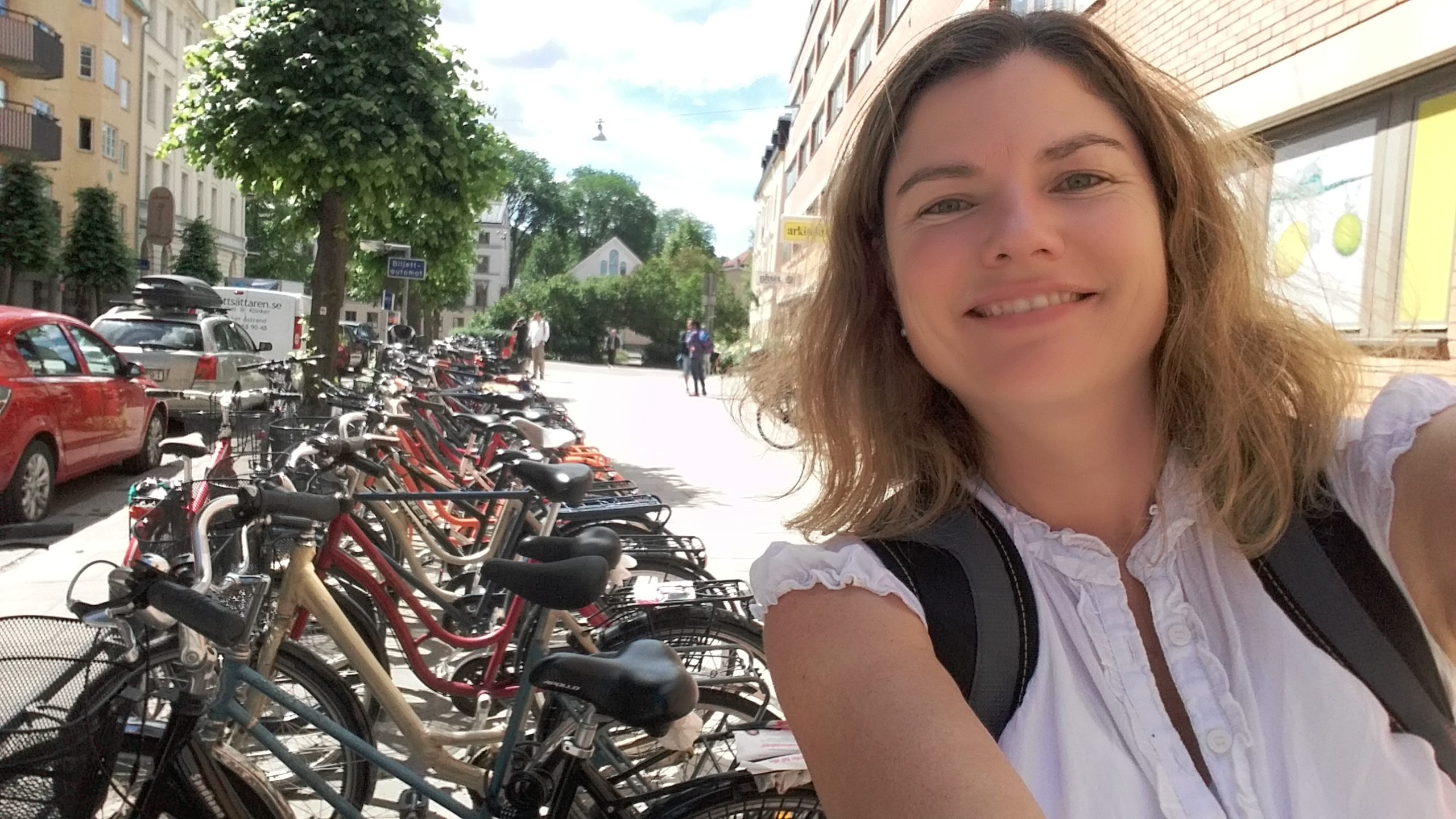Emma attended the 4th disABILITY MUNDUS Doctoral School at Uppsala University, Sweden.
Pre-departure:
Preparations for my trip. As a mom of a baby and a 5 year old I had to ensure that I had everything prepared for when I was away (from expressed breastmilk, meals to babysitters). I decided to travel as light as possible as I was planning to use public transport in Sweden. I learned that while their transport systems work, they can be busy and crowded during peak time so the smaller by bag the better. I took a small wheelie bag and a laptop backpack to make my life easier. Putting a bright tag on the bag really helped when 300 black wheelie bags get put on the airport carrousel. I made sure that I had printed out all of the time tables and knew which companies operated in which areas before hand. I am very glad that I did as their central station could be very overwhelming if coming off a 16 hour flight.
Also, knowing that there are two train companies really assisted me in deciding which was the cheapest and which would get me to the closest underground or station. I also ensured that I found out where the free public sleeping chairs were in Dubai which came in handy with my long lay over in the airport. It is important to make sure that you work out the time differences to avoid over sleeping by default and missing your connecting flight! It is also important to know that some airlines such as Emirates offer a free meal pass at certain restaurants in the terminal if your lay over is greater than 4 hours. If there are any other students travelling via Dubai while still feeding a baby there are nurseries available to express milk in differing spots in the terminals.
You will also need to make sure you have an international plug for laptops and chargers as our South African plugs don’t fit. I suggest that you take these plugs on board certain flights such as Emirates as there are plug sockets on each seat if you want to work on your laptop during the flight. Travelling with my running takkies meant I could walk the long distances throughout the terminals and catch public transport with ease with swollen feet. When booking accommodation I suggest that you really shop around. In Sweden there are loads of hotels to choose from and using a comparison website really helped. I made sure that I found a hotel close to public transport so I could leave my bag at the hotel and carry my laptop bag with me to the conference venue at the university in Uppsala. This was a good call as the town was very hilly and I would have battled to pull my wheelie bag up cobbled streets and hills. If arriving on a Sunday, check what shops will be open as many close early and finding a meal can be difficult on a Sunday evening. I was completely blown away by the number of people who ride bicycles in Uppsala! Parents towing young children, old people and ladies in high-heals all riding their bicycles. The biggest challenge was to find a spot to park ones bike! After lectures and before sessions I took the opportunity to see as much of the sites as I could. Not the touristy sections, but the parts where the locals go.
Conference & Short Course:

I had the privilege of attending a 5 day workshop as well as a two day conference in Sweden. The workshop was called MAKING disability (4th disABILITY MUNDUS doctoral school) and was hosted by the Department of Sociology at Uppsala University. DisAbility MUNDUS is a group of European academics and universities that are actively engaged in and support scholarly research on disAbility. I had to opportunity to meet with some disability specialists from the Nordic countries and Canada, some of whom I had read about with great interest. It was wonderful to hear presentations from these experts and to be able to ask questions at the end of each session which is so much easier and less intimidating for me than trying to send them an email.

I was the only student from the southern hemisphere so there were a number of areas that we differed in terms of context, language and background. The sessions were a good mix of theory, discussions, activities and site visits. We had a guest lecture from a Para Olympian tennis player Anders Sépulchre Hård titled ‘Consider making as a production process’ which was really interesting. We had a visit to SUF Resource Center in Uppsala which is a regional initiative to support the needs of children and parents in families where one or both of the parents has an intellectual disability or other cognitive difficulties. They gave us a presentation on how they provide training to potential parents with intellectual disabilities on how to look after a baby and be a good parent.

The other session that I really found fascinating was a summary of work being done on Alzheimer’s around the globe. We each had the opportunity to present our research area and received some very valuable feedback. It was valuable getting feedback from academics and students from the global north. While the lectures were all conducted in English I found it pretty tough lip-reading certain presenters due to their strong accents, but I made a plan. It was very strange leaving some sessions after 10pm with the sun still shining brightly in the sky as it was mid-summer. Feeling safe to walk alone across campus was a refreshing feeling as a female student. I then travelled across from Uppsala to Stockholm to attend the Fifth Annual Conference of ALTER that took place in Stockholm. ALTER, falls under the European Society for Disability Research. Its goal is to offer a European and international multidisciplinary view of disability research, across its whole spectrum, addressing socio historical and political dimensions as well as the subjective experiences of the actors concerned (disabled persons themselves and those close to them, professionals of the field and other social and political actors). Considering disability as a category of analysis is also likely to shed light on the modes of organisation of contemporary societies. I attended a number of very interesting presentations and made contact with many students and academics during the lunches and teas. A highlight of the conference as an excursion the City Hall where we got to see where the Nobel Peace Prize is given and had a dinner in the large banquet hall. Here I got the opportunity to meet with one of my most influential researchers Dr Nora Groce who conducted research into the Deaf gene on Martha’s Vineyard who Oliver Sacks wrote about in his famous book.
Return:
Returning to South Africa made me appreciate the supervision that I receive from my host Prof Leslie Swartz as some of my fellow students do not receive the same amount of mentorship, support and belief in their work. Returning from Sweden gave me new perspectives into how the Global North does not have all the answers, and that in some regards are almost going backwards in terms of rights and access for people with disabilities. This really surprised me and I was not expecting this. I was interested to see how they wanted my opinion regarding disabilities issues and that some solutions can be solved right here in South Africa without the assistance from global partners.
I really enjoyed meeting the disability researchers whose work I had used a great deal in my research and studies. It gave me the opportunity to ask the questions that I had and to see their passion for their area. Some gave me some very valuable advice which I have already started to use and feel that my work is better as a result of this. Some of the workshops and presentations made me question more and not take things at face-value, even from those who I saw as experts in the field. My trip made me realise how valuable meeting and helping students from other countries is. I really wish that I had had a better experience from my hosts and will make sure to be as helpful and inclusive I can be to any visiting students. It taught me to go out and make friends with other students and to share as much about South Africa as I could. These students who I befriended taught me so much about their country and living with disabilities that was very refreshing. My trip has definitely encouraged me to keep in contact with other people in my field and we have already looked at possible partnerships and co-authored journal articles. I hope to return to the Nordic countries again in the future and collaborate with other institutions. Hopefully I will be able to influence the selection criteria to include more participants from the global south so that more students will be able to gain the experience that I have. It has also created an appreciation for bicycle riding, even in the snow!

